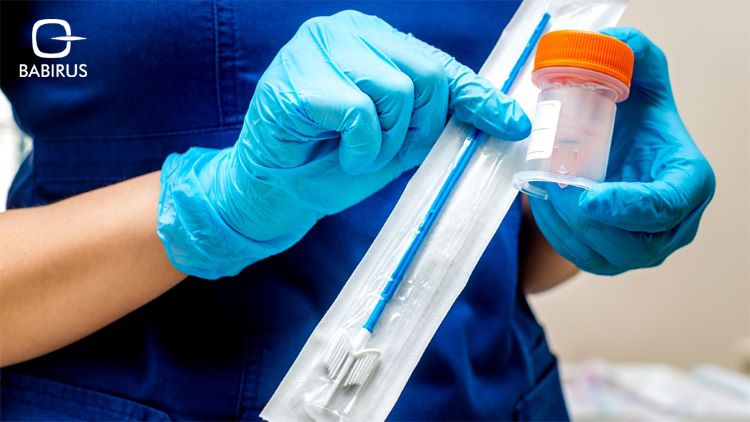The Importance of Cervical Cytology (Pap Smears)

Early detection and prevention of cervical cancer is a vital thing to achieve positive healing rates, especially with cervical cytology.
Moreover, all the developments in used screening tools allow doctors and healthcare specialists to identify abnormal cells in the cervix before they even become cancerous, leading to improved women’s chance of identifying potential problems early.
Especially since cervical cancer is considered one of the most avoidable cancers when caught early, thus, all doctors advise regular Pap smears to protect women’s health.
In this article, we are going to share with you a full guide about cervical cytology, including early detection, cervical cancer screening, steps of Pap smear procedure, and Pap smear results, next to the important FAQs about cervical cancer and cytology.
Understanding Cervical Cancer:
The main reason behind cervical cancer is the abnormal growth of cells in the cervix which develops to become out of control, moreover, these changes could happen for many reasons, including infection with high-risk types of human papillomavirus (HPV), a virus spread through sexual contact.
However, although many HPV infections could clear up on their own, yet, continuous infections with certain strains of HPV could lead to changes in the cervical cells over time, potentially resulting in cervical cancer.
Cytology in cancer diagnosis is a main process and step in cancer screening, especially cervical cancer screening, as it is considered a simple and anti-invasive procedure that is done by collecting and examining cells from the cervix to detect not only cancerous cells but also precancerous changes.
Additionally, these screening results allow for early interventions that can prevent cervical cancer from developing and growing with early detection and effective treatment, which enhance patient outcomes.
The cervical cancer screening is done in simple steps, as a healthcare provider collects cells from the cervix, to be examined in a laboratory to look for abnormalities, which could be precancerous changes or signs of infection.
The Role of Cervical Cytology:
The cervical cytology is one of the most effective and patient-friendly ways to catch abnormal cervical changes at early stages before they turn into cancer, which helps in the treatment strategy efficiency, leading to reducing the risk of developing cervical cancer in the first place.
We can say that the main reason behind cervical cytology’s popularity among medical professionals on the international level, next to the early detection benefit, is its simple and effective procedure that has become a basic step in cervical cancer screening programs.
When to Get a Pap Smear?
If we want to highlight the best time for Pap smears, or when doctors recommend cervical cytology, even if you do not feel that anything is wrong, then we can divide women’s need for Pap smears into two categories:
- Women beginning at the age of 21 to 29, are usually advised to have a Pap smear every three years.
- Women between 30 to 65 years old are advised to have a cervical cancer screening with an HPV test every 5 years if the results are normal.
However, keep in mind that even if a woman had the HPV vaccine, yet, it is still important to do regular cervical cytology, especially since the vaccine protects against the most common high-risk HPV strains, but it does not cover all of them or prevent cervical cell changes.
Additionally, regular Pap smears are important for sexually active women, as HPV can be transmitted even with the use of condoms.
The 4 Steps of Pap Smear Procedure:
The Pap smear procedure is a simple and easy procedure that takes only a few minutes, but, must done in a sterilized environment and by a professional healthcare provider in this order:
1. Preparation:
The patient will be asked to lie down on an exam table, and a speculum will be gently inserted into the vagina area to allow the healthcare provider to see the cervix clearly.
2. Cell Collection:
By using a small brush or spatula, cells from the cervix surface will be collected for examination.
3. Laboratory Analysis:
In this step, the collected cervix cells will be placed on a slide or in a liquid solution and sent to a lab for analysis.
4. Results:
The Pap smear results usually take from a few days to a week to come out, and then your healthcare provider will contact you with the results, and any abnormal findings will be discussed to set a treatment plan or request additional tests.
Interpreting Pap Smear Results:
To help you understand cervical cytology Pap smear results better, we are going to divide the results into two main categories:
· A Normal Pap Smear Result:
This result indicates that no abnormal cells were found, and you can continue with regular screening intervals as your doctor recommends.
· An Abnormal Pap Smear Result:
When having abnormal results that means that changes in the cervical cells were detected, however, that does not necessarily mean you have cervical cancer, as in many cases, it could indicate the presence of precancerous cells, infections, or other benign conditions.
Thus, if your Pap smear results are abnormal, further tests, such as a colposcopy or a biopsy, will be requested to examine the cervix more closely, leading to help your healthcare provider set the best personalized medicine treatment strategy based on your unique condition.
Benefits of Regular Pap Smears:
There are many great benefits of regular Pap smears, and now we are going to share with you the most popular ones:
- Early detection of abnormal cells through cervical cytology greatly increases the chances of preventing cervical cancer or catching it at an early stage when it is easier to treat.
- Regular screening provides peace of mind, knowing that you are taking proactive steps to protect your health.
- Regular Pap smears are part of the strategy of cervical cancer prevention with the HPV vaccine, as they provide early abnormal detection before it turns into serious health issues.
Addressing Common Concerns of Cervical Cytology:
While cervical cytology and the Pap smear are regular medical procedures, yet, many women have their own concerns, thus, we are going to address some of the most common concerns with details and information about them:
· Accuracy of Pap Smears:
Despite all the developments in cervical cytology, yet some false negatives could happen, this means that false abnormal cell results might be detected while they are totally normal, or vice versa, thus, doing the test in a reliable medical center is vital with full patient diagnosis.
· Preparing for a Pap Smear:
There is no special preparation required, but it is advisable to avoid intercourse, douching, or using vaginal medications for 48 hours before the test, and schedule the Pap smear appointment when you are not menstruating to guarantee the result accuracy,
· Risks and Side Effects:
We can clearly say that the procedure is totally safe, but mild side effects can include slight discomfort, spotting, or irritation, moreover, serious complications are extremely rare when the Pap smear is done by professionals.
· Post-Pap Smear Care:
As we said, after a Pap smear, it is normal to experience some mild discomfort or spotting, however, if you experience severe pain, heavy bleeding, or signs of infection, you should contact your healthcare provider immediately to cure any issue effectively.
· Impact on Pregnancy:
It is a proven international medical fact that cervical cytology does not harm fertility or pregnancy, furthermore, it is safe to undergo a Pap smear during pregnancy and can be an important part of prenatal care.
· Frequency of Screening:
At this point, it is important to follow your healthcare provider’s recommendations to set the right frequency for Pap smears based on your current health condition, age, health history, and risk factors to ensure optimal cervical health.
5 FAQs About Cervical Cytology:
Many women have concerns about Pap smears, from discomfort during the procedure to what happens if the results come back abnormal, therefore, let us address some of the most common questions:
1. How Often Should I Get a Pap Smear?
The perfect answer to this question is for sure provided by your healthcare provider, however, the general medical rules indicate that women between 21 to 29 years should have a Pap smear every three years, and those aged 30 to 65 years, should have a Pap smear combined with an HPV test every five years.
2. What Are the Symptoms of Cervical Cancer?
Unfortunately, cervical cancer is considered a silent cancer, thus, symptoms could not be clear, which make regular Pap smears so important.
Yet, in later stages, cervical cancer symptoms may include abnormal vaginal bleeding, pelvic pain, or pain during intercourse.
3. What Does a Pap Smear Feel Like?
Some women shared that during a Pap smear, they felt a slight pressure or mild discomfort when the speculum is inserted and the cells are collected, but, the entire procedure usually takes only a few minutes, and most women indicate it as a quick and manageable procedure.
4. What Does an Abnormal Pap Smear Mean?
An abnormal Pap smear shows that there are some abnormal cells in the cervix tissue, however, that does not mean you have cervical cancer, as further testing will be required to determine the cause of these cell changes, including various follow-up procedures, like a colposcopy, to provide more detailed information.
5. Is a Pap Smear Painful?
Most women indicate that they did not feel any pain during the Pap smear procedure, just some mild discomfort, particularly, that the procedure is considered a quick one.
One final thought,
Cervical cytology, through regular Pap smears, is an effective method for protecting against cervical cancer, as it allows early detection, and helps doctors identify abnormal cells before they become cancerous, thus, Pap smears are an important part of cervical cancer screening.
Medical supplier providers, like Babirus in Dubai, are providing advanced cervical cytology technologies like Lituo Biotechnology to enhance treatment strategies with comprehensive insights and solutions.

